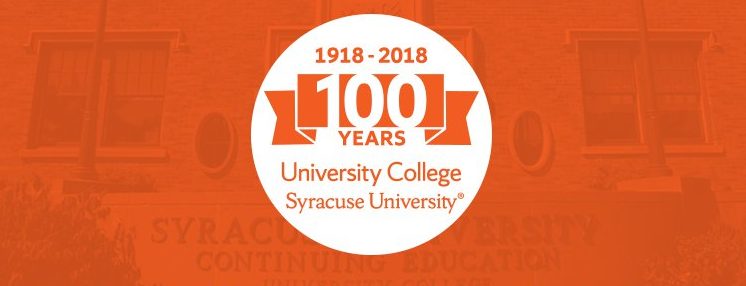University College is launching a 120-credit Bachelor of Professional Studies (BPS) degree in Cybersecurity Administration. The fully online program will provide the skills needed to manage people and technologies required to protect information, information systems and infrastructures. Applications are now being accepted for the fall 2018 semester. For more information visit the website.
News
UC Celebrates its Centennial Year

2018 marks a century of bringing lifelong learning to part-time students who seek to transform their lives through education. For the past 100 years, University College has helped thousands of part-time students earn a Syracuse University degree.
UC hosted an Open House in April. Guests took a progressive tour, enjoyed refreshments and socialized with their partners across campus.
Upcoming Events:
- September 7: a campus-wide picnic to welcome students, staff, and faculty back to campus. Specific details will be available on our website.
- October 6: Centennial Gala at Goldstein Auditorium in Schine Student Center. A fundraising effort to create a Centennial Fund, to offer financial aid for everything from tuition and fees to class materials, computers, and childcare.
Watch for additional details on these upcoming events on our website.
Foundation Sponsorships Help Students Attend SU Summer Programs
Summer College for High School Students partners with more than a dozen organizations and foundations to support programs that serve youth who are at risk of not reaching their full potential – particularly youth in low-income communities.
Of the 457 students enrolled in Summer College courses in 2017, more than 130 attended at no cost to themselves or their families thanks to these established partnerships. In the last eight years, 942 students have attended Summer College through these collaborations.
Two of the most significant partnerships are with the Charles Hayden Foundation (CHF) and the Price Family Foundation (PFF). CHF students attend for six weeks, take two classes and earn six Syracuse University credits. PFF students attend Summer College for four weeks and take two consecutive 2-week programs.
Syracuse University Summer College offers high school students the opportunity to explore college majors and experience college life with credit and noncredit programs.
University College Celebrates its 70th Commencement Celebration
The University College Commencement Celebration for part-time students took place on Thursday, May 10, at Hendricks Chapel, followed by a reception on the Quad.
Benjamin Vasquez (BPS in Creative Leadership and 2018 recipient of the Chancellor’s Award for Public Engagement and Scholarship) was the student speaker. Patricia McBride (BPS in Creative Leadership) was UC’s class marshal. Candace Campbell Jackson, senior vice president and chief of staff for Chancellor Kent Syverud, gave the keynote address.
Seven UC students were named Alumni Scholars. They earned a GPA of 3.63 and higher: Karlea Abair, Philip Adams, Lark Allen, Andree Finkelstein, Amanda Riccardo, Benjamin Vasquez, and Kenneth Wilcox.
Awards also recognized students’ outstanding achievement in other schools/colleges:
- Hortence Cochrane Award: Karlea Abair, a part-time social work student in the Falk College of Sport and Human Dynamics; GPA of 3.706.
- Nancy C. Gelling Award: (graduate with the highest overall grade point average for a first bachelor’s degree) Andree Finkelstein, B.A. in Geography from the College of Arts and Sciences; GPA of 3.806.
- Sylvia Wyckoff Award (outstanding achievement in the College of Visual and Performing Arts): Philip Adams, who graduated with a bachelor’s degree in Fine Arts, with a GPA of 3.778.
Faculty, staff, and departments across campus who demonstrate a commitment to providing quality education to UC students were also recognized:
- Deans Excellence Award: (acknowledges outstanding contributions of a UC staff member who has been instrumental to the success of UC); Jennie McLaughlin, UC director of Information Systems.
- Staff Service Award: Office of Veterans and Military Affairs. Colonel Ron Novack (RET.), executive director, accepted on behalf of his department.
- Excellence in Teaching Award: Faith Plvan.
- Excellence for Online Teaching Award: Susan Conklin.
English Language Institute Completes Successful Pilot Program
As part of an initiative to supplement existing tutoring services at the University, the English Language Institute (ELI) completed a successful pilot for one-on-one tutoring services tailored to meet specific needs of international students and faculty.
The service offers weekly half-hour sessions for otherwise highly competent speakers of the language, who benefit from reinforcement exercises from TESOL-trained experts in areas where they require additional reinforcement. “The program provided by the English Language Institute has been a valuable resource for our scholars,” says Margaret E. Lane, assistant director of the Executive Education Program at the Maxwell School. “ELI was able to identify each student’s area of need and as a result, the students gained confidence academically.”
